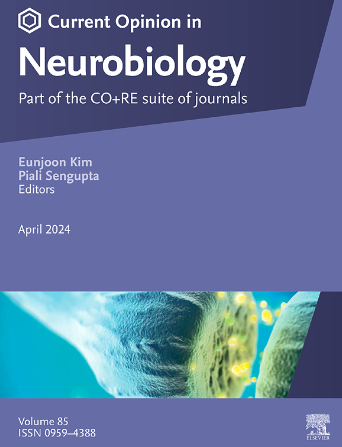是什么场合?阶段性多巴胺信号和内感受
IF 5.2
2区 医学
Q1 NEUROSCIENCES
引用次数: 0
摘要
阶段性多巴胺在与奖励相关的学习中至关重要,并为由提示触发的行为分配价值。行动的结果反过来又调整了行为重复的可能性。也就是说,结果会强化行为——这一过程也涉及到阶段性多巴胺。然而,行动的价值及其结果是不断波动的。内部状态-从生理需要到满足门或应用增益到线索诱发的行动及其结果的评估。我们关注的是内感受信号如何影响多巴胺神经元,从而改变提示和奖励导向行为下的相位信号。我们关注的是由食物或液体缺乏引起的内感受信号,因为对这些需求的外周激素反应是相对完善的。该领域的一个难题是,如何将缓慢积累的、更像强直的生理信号整合起来,以调整短暂而紧锁时间的多巴胺对环境刺激的反应。本文章由计算机程序翻译,如有差异,请以英文原文为准。
What’s the occasion? Phasic dopamine signaling and interoception
Phasic dopamine is critically important in reward-related learning and assigns value to actions triggered by cues. Outcomes of actions in turn adjust the probability that a behavior will be repeated. That is, outcomes reinforce behavior—a process that also involves phasic dopamine. The value of actions and their outcomes, though, is ever fluctuating. Internal state—from physiological need through satiation—gates or applies gain to cue-evoked actions and the evaluation of their outcomes. We focus on how interoceptive signals may influence dopamine neurons to modify the phasic signaling underlying cue and reward-directed behaviors. We focus on interoceptive signals that arise from food or fluid deficit since the peripheral hormonal responses to such needs are relatively well established. A puzzle for the field is understanding how slowly accumulating and more tonic-like physiological signals are integrated to tune the brief and tightly time-locked phasic dopamine responses to environmental stimuli.
求助全文
通过发布文献求助,成功后即可免费获取论文全文。
去求助
来源期刊

Current Opinion in Neurobiology
医学-神经科学
CiteScore
11.10
自引率
1.80%
发文量
130
审稿时长
4-8 weeks
期刊介绍:
Current Opinion in Neurobiology publishes short annotated reviews by leading experts on recent developments in the field of neurobiology. These experts write short reviews describing recent discoveries in this field (in the past 2-5 years), as well as highlighting select individual papers of particular significance.
The journal is thus an important resource allowing researchers and educators to quickly gain an overview and rich understanding of complex and current issues in the field of Neurobiology. The journal takes a unique and valuable approach in focusing each special issue around a topic of scientific and/or societal interest, and then bringing together leading international experts studying that topic, embracing diverse methodologies and perspectives.
Journal Content: The journal consists of 6 issues per year, covering 8 recurring topics every other year in the following categories:
-Neurobiology of Disease-
Neurobiology of Behavior-
Cellular Neuroscience-
Systems Neuroscience-
Developmental Neuroscience-
Neurobiology of Learning and Plasticity-
Molecular Neuroscience-
Computational Neuroscience
 求助内容:
求助内容: 应助结果提醒方式:
应助结果提醒方式:


